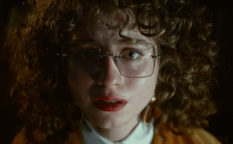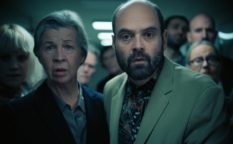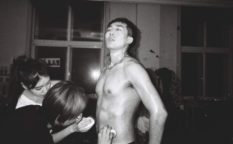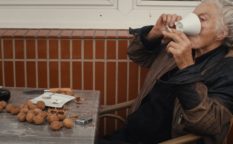Banksy: Most Wanted (2020)
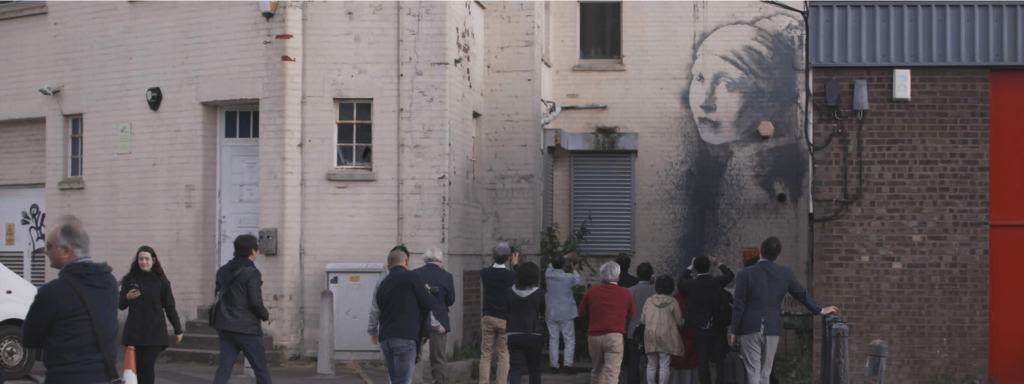
To his fans, the anonymous British street artist known as Banksy is a rebel with many causes, a subversive man of the people whose work speaks truth to power. To his critics, he is an overpraised prankster and wealthy hypocrite whose politically charged stencil statements feel trite and adolescent. The French-made documentary Banksy: Most Wanted leans strongly towards the first view, heavy on awestruck reverence and light on critical insight. Even so, the first-time directing duo Aurélia Rouvier and Seamus Haley have assembled a slick, well-crafted introductory portrait of an important cult figure, which will potentially appeal to younger viewers and curious novices. Currently touring festivals both virtual and physical, the film screened at IceDocs in Iceland last month.
Rouvier and Haley begin Banksy: Most Wanted with a notorious stunt from 2018, when the artist shredded his painting Balloon Girl by remote control soon after it was sold for £1.04 million at Sotheby’s auction house in London. Discreetly pre-arranged with the auctioneers, this auto-destructive prank was widely seen as a subversively satirical comment on the commodification of art, but it was also great publicity for everybody involved, increasing the market value of the original artwork. The directors present these events at face value, as a masterstroke of anarchic detournement rather than as cleverly calculated promotion of the Banksy brand. In truth, it was both.
Banksy: Most Wanted offers a briskly selective skip through its subject’s career, from underground graffiti artist in the 1990s to hugely successful, media-savvy, world-famous cultural icon today. While Banksy himself inevitably remains a shadowy presence throughout, Rouvier and Haley interview a broad range of friends, associates and commentators. Some of them, notably the artist’s former agent Steve Lazarides, offer informed insider insights. But too many come across as comically besotted fanboys, especially the Parisian gallery owner who gushingly compares Banksy to Warhol and Picasso. This is not nuanced documentary, it is simple-minded hagiography.

The film’s most interesting section is devoted to competing theories about Banksy’s true identity. Claims that the artist’s real alter ego is Robert del Naja of Bristol band Massive Attack, or Jamie Hewlett of the cartoon pop collective Gorillaz, come across as flimsy speculation by unreliable narrators. A more plausible story is that Banksy is Bristol-born Robin Gunningham, as first reported by a UK newspaper in 2008, then later backed up with photos and stories in other publications. Although this version is the most credible and widely agreed, Rouvier and Haley leave the question fuzzy, preferring myth and mystique over factual substance.
Banksy: Most Wanted makes the valid point that the artist’s left-leaning political worldview is crucial to his appeal, from his anti-war and anti-police stencils to his large-scale artworks in Israel and the West Bank. As a hugely successful cultural icon making big profits from a system that he frequently critiques, his contradictory relationship with fame and capitalism is also worth exploring. The film-makers include a heart-warming story from 2014 of how Banksy donated a guerrilla mural to help save a struggling sports club in an economically deprived part of Bristol. But deeper questions about his ideological and socio-political role deserve more examination than this glib documentary can deliver.
Despite their obvious enthusiasm for Banksy, Rouvier and Haley paint a strangely one-dimensional portrait of him here, ignoring his writing and film work. Ironically, the artist himself offered a far more thoughtful and revealing assessment of his place in the cultural landscape with his own Oscar-nominated 2010 documentary, Exit Through The Gift Shop. Curious novice fans will learn more from that film than from this sketchy cinematic stencil. An intrusively loud, melodramatic score by Thomas Carteron adds to the sense that the directors favour shallow sensationalism over deep analysis, an accusation that could be levelled at Banksy himself.
Original title: Banksy: Most Wanted
Year: 2020
Runtime: 90 minutes
Language: English/French
Country: France
Directors: Aurélia Rouvier, Seamus Haley
Screenwriters: Aurélia Rouvier, Laurent Richard
Producer: Laurent Richard
Cinematographers: Joseph Haley, Mathias Denizo
Editor: Seamus Haley
Music: Thomas Carteron
Production companies: Scarlett Production, Canal Plus









